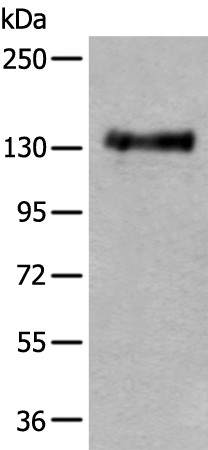
| WB | 咨询技术 | Human,Mouse,Rat |
| IF | 咨询技术 | Human,Mouse,Rat |
| IHC | 咨询技术 | Human,Mouse,Rat |
| ICC | 技术咨询 | Human,Mouse,Rat |
| FCM | 咨询技术 | Human,Mouse,Rat |
| Elisa | 1/5000-1/10000 | Human,Mouse,Rat |
| Aliases | LRP; HLPR; PTPA; HEPTP; HPTPA; RPTPA; PTPRL2; HPTPalpha; R-PTP-alpha |
| WB Predicted band size | 91 kDa |
| Host/Isotype | Rabbit IgG |
| Antibody Type | Primary antibody |
| Storage | Store at 4°C short term. Aliquot and store at -20°C long term. Avoid freeze/thaw cycles. |
| Species Reactivity | Human, Mouse, Rat |
| Immunogen | Fusion protein of human PTPRA |
| Formulation | Purified antibody in PBS with 0.05% sodium azide and 50% glycerol. |
+ +
以下是关于PTPRA抗体的3篇参考文献及其摘要概括:
1. **"Protein tyrosine phosphatase α regulates EGFR activation by modulating EGFR ligand binding"**
*Böhmer, F., et al.*
该研究利用PTPRA特异性抗体,通过免疫共沉淀和Western blot技术,揭示了PTPRA通过去磷酸化EGFR的特定酪氨酸残基,调控EGFR配体结合能力及其下游信号传导,影响细胞增殖与迁移。
2. **"PTPRA promotes cell adhesion and migration via interaction with integrin β1 in breast cancer"**
*Zheng, Y., et al.*
作者通过免疫荧光和免疫印迹实验(使用PTPRA抗体),发现PTPRA与整合素β1直接相互作用,增强乳腺癌细胞的粘附和迁移能力,表明其可能作为癌症治疗的潜在靶点。
3. **"PTPRA negatively regulates insulin signaling by dephosphorylating the insulin receptor"**
*Tiganis, T., et al.*
该研究通过PTPRA抗体检测组织表达水平,结合基因敲除技术,证明PTPRA通过去磷酸化胰岛素受体,抑制胰岛素信号通路活性,提示其在代谢疾病中的调控作用。
以上文献均聚焦于PTPRA在不同信号通路中的功能机制,抗体主要用于检测蛋白表达、相互作用及磷酸化状态。
The PTPRA antibody targets protein tyrosine phosphatase receptor type A (PTPRA), a member of the protein tyrosine phosphatase (PTP) family. PTPRA plays a critical role in regulating cellular signaling by dephosphorylating tyrosine residues on target proteins, thereby modulating processes like cell growth, differentiation, and oncogenic transformation. Structurally, PTPRA contains an extracellular region with fibronectin-type III-like domains, a single transmembrane segment, and an intracellular catalytic domain. Its activity counterbalances tyrosine kinase signaling, maintaining equilibrium in pathways such as MAPK, Src, and growth factor receptor cascades.
PTPRA is implicated in various diseases, including cancer, where it may act as a tumor suppressor or promoter depending on context. For example, it can inhibit Src-family kinase activity in some cancers while promoting EGFR signaling in others. Additionally, PTPRA is linked to insulin resistance and neurodegenerative disorders. Antibodies against PTPRA are essential tools for studying its expression, localization, and function. They are widely used in techniques like Western blotting, immunohistochemistry, and immunofluorescence to detect endogenous PTPRA in cell lines, tissues, or disease models. Validated antibodies help clarify PTPRA's dual roles in signaling and pathology, aiding therapeutic target exploration.
×